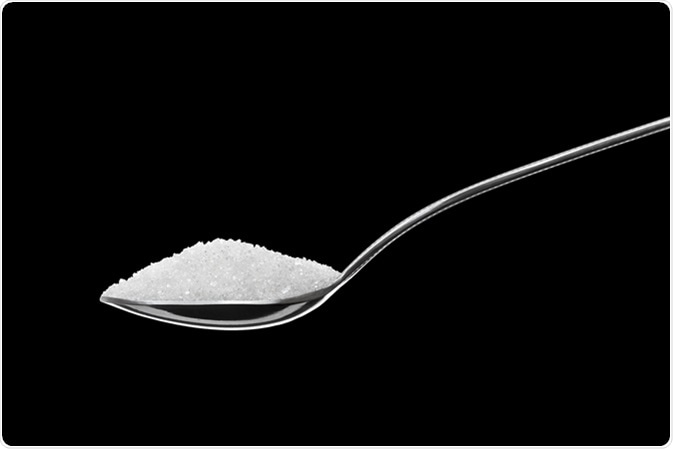By Jeyashree Sundaram (MBA)
Sucralose is a zero-calorie chemically synthesized sweetener that is extracted from sucrose. Sucralose is 650 times sweeter compared with naturally extracted sugar. It is often used in a wide range of fizzy drinks, table-top sweeteners, salad dressings, baking mixes, breakfast cereals, and chewing gum due to its bitter-free aftertaste.
Sucralose is blended with other calorie-free sweeteners such as dextrose and maltodextrin to reduce its excessive sweetness. Most of the sucralose consumed is not completely absorbed by the human body and is disposed of through excretion. Approximately 8–20% of the sucralose gets into the blood and is excreted through urine without metabolism.

Image Credit: MidoSemsem / Shutterstock
Safety
The European Food Safety Committee (EFSC) has affirmed that sucralose is safe for use by humans. The daily ingestion level of sucralose is fixed at 15 mg/kg/d by EFSC. Persons taking various medications, children, and infants are not restricted from the use of sucralose. Sucralose does not show any carcinogenic activity even when the levels of exposure are much higher than normal levels of ingestion. Consuming artificial sweeteners like sucralose during pregnancy was found to be the cause of an elevated risk in babies to become overweight.
Effects of Sucralose
Sucralose usually causes very mild side effects. These side effects due to sucralose intake can be visible in the human body after a long time. Consumption of a limited sucralose intake may not be harmful to humans. Sucralose consumed is usually eliminated from the body without being metabolized, however regular usage over longer period makes it to get stored in the body resulting in harmful effects. The major health problems that are caused due to sucralose intake are listed below:
- Gastrointestinal tract (GI): Various research is being carried out to study the effects of the accumulation of sucralose in the GI tract. Accumulation of sucralose in the GI tract can affect the metabolism and microfloral composition of the gut. Gut flora perform various functions that include fermentation, immune response modulations, vitamin synthesis, pathogen inhibition, drug metabolism, and the absorption of magnesium and calcium.
- Makes medicine ineffective: Sucralose ingestion may reduce the absorption of certain therapeutic drugs, thereby decreasing their effectiveness. These drugs include cancer and heart disease medications.
- Digestion: Various researches have indicated that chemically extracted sweeteners can disturb smooth digestion by causing bloating, diarrhea, and gas. Good bacteria in the gut ensure a smooth digestion process, which can be replaced by bad bacteria due to the accumulation of sucralose in the GI tract. This condition may increase the level of water and nitrogen gas in the colon, which in turn may lead to diarrhea. Researches have revealed that the majority of indigestion symptoms are caused due to consumption of artificial sweeteners.
Effects on Diabetics
Sucralose has no major effects on diabetic patients. It has been observed that there is no change in the body weight of diabetic patients when sucralose capsules are taken twice per day over three months and no major health complications were aroused due to regular intake of sucralose. Yet, proper information about capsule dissolution characteristics is not provided. Hence, more studies of sucralose on maintaining and controlling diabetes are required.
Effects on Heating
Sucralose becomes unstable when heated at temperatures beyond 180°C. It has been observed from research data that sucralose starts to generate chloropropanols when it becomes unstable. This condition may increase cancer risk in humans. Studies have concluded that more research is required on the harmful effects of sucralose when heated.
Effect on Body Weight
The effect of sucralose ingestion on the body weight in adults does not seem to be studied well. Clinical trials were carried out in children over 18 months, and they were allowed to take sugar sweetened drinks (8-oz per day) that provided 104 kcal. The individual sugar-free drinks contained 12 mg acesulfame-K and 34 mg sucralose. When the urinary sucrose levels of these children were monitored, it was observed that the calorie consumption was higher in children who had taken sugar sweetener than those who had sucralose ingestion. The weight gain was 1 kg higher in children who had sugar sweetener compared to those who had sucralose intake.
Evidence
- In 1998, sucralose was accepted as a table-top sugar-free sweetener by Food and Drug Administration (FDA). In the following year, FDA confirmed that sucralose was safe for general use by humans. More than 110 studies were evaluated by FDA for approving the safety of sucralose.
- The scientific committee of food (SCF) in Europe affirmed that sucralose is safe for human ingestion, which has been confirmed in the evaluation of one of its evidences in the year 2000. Specifically, it is proved that sucralose does not cause any harm to fertility, the immune system, and pregnancy. Also, it does not increase the levels of sugar.
- In 2011, evaluation by European Food Safety Authority (EFSA) affirmed that sucralose consumption does not have any effect on tooth decay.
Further Reading
Last Updated: Aug 21, 2023